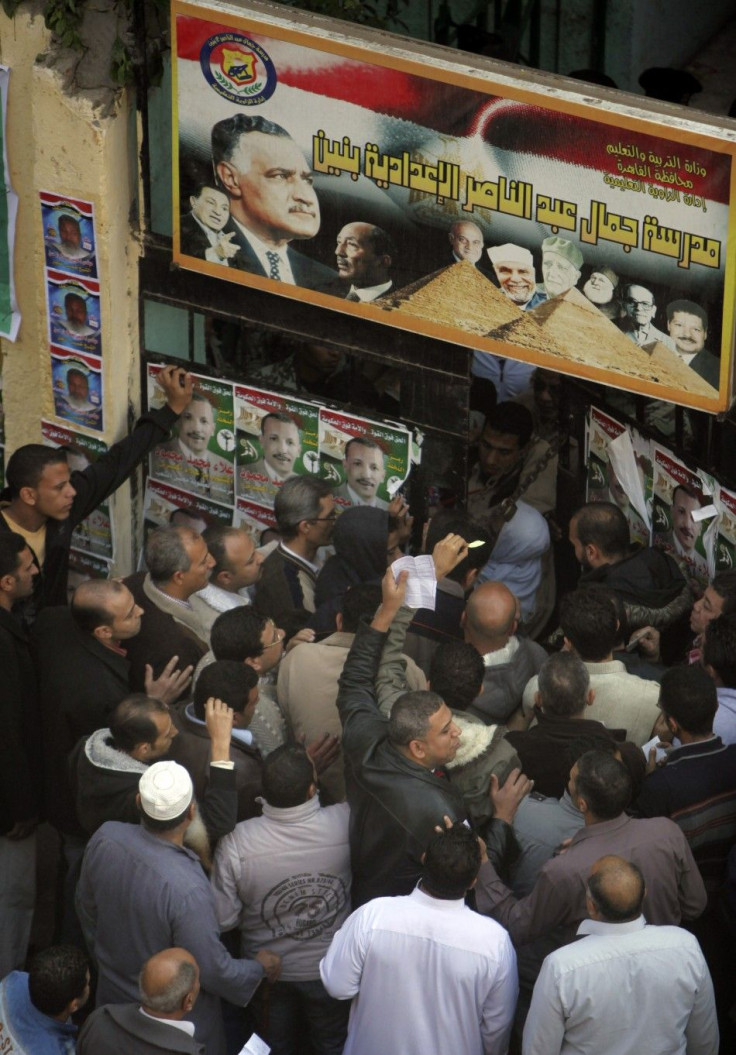Egypt Awaits Vote Result; Brotherhood Win Likely

Egypt will hear the results of elections which Islamist parties look set to win Friday, and protesters have called a rally to remember 42 people killed in clashes with police last month.
Islamist success at the polls in the most populous Arab nation would reinforce a trend in North Africa. Moderate Islamists lead governments in Morocco and post-uprising Tunisia after election wins in the last two months.
Egyptians voting freely for the first time since army officers ousted the king in 1952 seem willing to give Islamists a chance. We tried everyone, why not try sharia (Islamic law) once? asked Ramadan Abdel Fattah, 48, a bearded civil servant.
Parliament, whose exact makeup will be clear only after Egypt's staggered voting process ends in January, may challenge the power of the generals who took over in February after an uprising toppled President Hosni Mubarak, an ex-air force chief.
Under pressure to make way for civilian rule, the military council said it will keep powers to appoint or fire a Cabinet while the Muslim Brotherhood, Egypt's oldest Islamic group, appeared to back off a statement from the party's head that the majority in parliament should form a government.
The first-round results had been expected on Thursday, but some constituencies did not complete their counts on schedule.
Youthful demonstrators have called their protest, to remember the martyred and to reinforce their demand that the army step down immediately, for after Friday prayers in Tahrir Square, the epicenter of opposition to Mubarak's rule.
The world is closely watching the election, keen for stability in Egypt, which has a peace treaty with Israel, owns the Suez Canal linking Europe and Asia, and which in Mubarak's time was an ally in countering Islamist militants in the region.
Washington and its European allies have urged the generals to step aside swiftly and make way for civilian rule. But they also worry that Islamist rule in Egypt might erode social freedoms and threaten Cairo's 1979 peace treaty with Israel.
PEACEFUL ELECTION, SOME INFRACTIONS
The Muslim Brotherhood says its new Freedom and Justice Party is set to win about 40 percent of seats allocated to party lists in this week's vote, which passed off peacefully, although with many irregularities.
FJP officials say the party also leads the race for individual seats that make up a third of the total in the poll.
Al-Nour Party, one of several newly formed ultra-conservative Salafist Islamist groups, said on Thursday it expected to pick up 20 percent of assembly seats overall.
The liberal multi-party Egyptian Bloc has said it is on track to secure about a fifth of votes for party lists.
For the first time in Egypt we don't see a political intention by the state to forge the elections, said Magdy Abdel Halim, coordinator of an EU-backed group of election monitors.
He said the infractions observed did not affect the legitimacy of a vote held in a reasonably fair atmosphere but local monitors urged stricter procedures to be implemented ahead of the next two stages of voting so that they are not repeated.
Egypt's April 6 youth movement, a prime mover in the revolt against Mubarak, said an Islamist win should not cause concern.
No one should worry about the victory of one list or political current. This is democracy and this great nation will not allow anyone to exploit it again, its Facebook page said.
BROTHERHOOD SEEKS TO ALLAY FEARS
If the FJP and Nour secure the number of seats they expect, they could combine to form a solid majority bloc, although it is far from certain the Brotherhood would want such an alliance.
Senior FJP official Essam el-Erian said before the vote that Salafists, who had kept a low profile and shunned politics during Mubarak's 30-year rule, would be a burden for any coalition. Salafists believe the Brotherhood has made too many compromises in its strategy to enter mainstream politics.
The FJP might seek other partners, such as the liberal Wafd or the moderate Islamist Wasat Party, set up by ex-Brotherhood members in 1996, although only licensed after Mubarak's fall.
Some Egyptians fear the Brotherhood might try to impose Islamic curbs on a tourism-dependent country whose 80 million people include a 10 percent Coptic Christian minority.
But Brotherhood officials said their goal was to end corruption and revive the economy not to ban alcohol or force women to wear headscarves.
The Brotherhood's intention to remain pragmatic was underlined by the latest statement from the FJP that appeared to back off remarks by its head that parliament should choose a cabinet, not the military rulers.
The discussion of the formation of the government is premature and the formation of parliamentary alliances is linked with the completion of the three stages of the elections, the statement said.
The priority of the Brotherhood, which gained trust by aiding the poor under Mubarak, is likely to be economic growth to ease poverty and convince voters they are fit to govern.
Essam Sharaf's outgoing government quit during protests against army rule last month in which 42 people were killed, most near Cairo's Tahrir Square, hub of the anti-Mubarak revolt.
Kamal al-Ganzouri, asked by the army to form a national salvation government, aims to complete the task in the next day or two, but has acknowledged that five presidential candidates had turned down invitations to join his cabinet.
(Additional reporting by Yasmine Saleh, Shaimaa Fayed, Maha El Dayan, Tom Perry and Dina Zayed; Writing by Alistair Lyon and; Peter Millership)
© Copyright Thomson Reuters {{Year}}. All rights reserved.





















